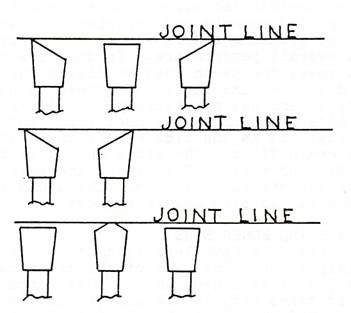Saw Blade Top Grinding
Top Grinding To Keep Diameter within Tolerance
Lowell Freeborn
Top Grinding is very important to the saw blade as it affects the tooth load, and if done poorly will cause the saw blade to cut very badly. Also See the article on Grinding saw Blades to learn the importance of side grinding and face grinding.
This operation must be done with a good solid index finger that does not spring when the tooth is forced against it. If the finger springs or moves differently each time a tooth is ground, the teeth will vary in height and create a variation in tooth load. If the tooth height varies, you again will have to ask yourself why you have so many teeth in the saw.
Assuring uniform tooth load is the major function of the tops of the teeth, therefore they must be accurately ground for correct geometry and height, and the grinding finish must be of good quality.
Several things affect good top grinding. The most important is the finger. Next most important is the wheel. Third most important would be the operator doing the grinding. A good rigid grinding machine is absolutely necessary and should be equipped with an accurate ball bearing saw holder.
In order to get good results on the outside of the saw, you must have an accurate hole or eye in the saw to start with. No saw bore should be over .002 thousandths of an inch over the nominal size of the bore. Even with close tolerance bores you must have the shaft the saw rotates on accurate and on size. The biggest problem, as it relates to bores and the eye of the saw, is bushings that are used to reduce a bore to fit the grinder arbor. It is impossible to grind a saw properly if the saw is turned on the bushing. You may start out new and do fairly well, but the bushings will begin to wear and your tolerance will disappear fast.
The better way is to bush the saw down with a bushing that has a bore which closely fits the shaft, and an outside which tapers very slightly, about .006 thousandths of an inch in 3/16" of bushing length. This will assure a good seat on the bushing O.D. which locates well down into the bore.
Now you must turn this saw and bushing combination on a ball bearing spindle so you do not create wear on the bushing. The very best way to prove you have a good set-up and an accurate one is to grind the saw and then dial the O.D. carefully. Mark any slight variations on the saw in the location they occur. Now remove the saw and bushing from the arbor. Again install the saw the way you did the first time and dial the O.D. again. If you do not repeat exactly, you have your answer, and also know how much your error is.
Runout on the O.D. of a rip saw is not nearly as critical as on a cut-off saw because of the large tooth load. Some service shops are aware of this and get sloppy in their work. It still takes no longer to do a good job than a poor one, and service people should get oriented into this routine.
The biggest assets you can have in top grinding are 1) a good accurate rugged machine to grind on, 2) a good solid index finger that absolutely does not yield when pressure is applied to it, 3) an accurate bushing system to center the saw properly, 4) a ball bearing spindle for the saw to revolve on, and 5) the desire to do a good job and improve your work at all times.
|
|
When top grinding, all tooth styles should be dial indicated on top to assure proper tooth height and proper joint.

